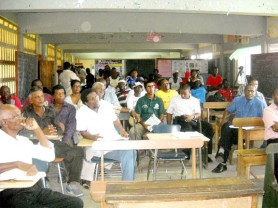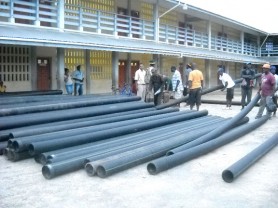Agriculture Minister Robert Persaud and other officials met around three dozen farmers at the Golden Grove Primary School yesterday where progress on drainage and irrigation works worth $457M was reported upon. Farmers, who came from Golden Grove, Victoria and the villages between, raised problems of drainage and irrigation.

Meanwhile, some farmers have asked that portions of President’s College land be made available to them for farming and Persaud says that he will facilitate this issue.
Currently, under the Agricultural Support Services Programme, the Ministry is undertaking drainage and irrigation works in the area. In the Golden Grove/Victoria area, $254M is being spent for the rehabilitation of drainage and irrigation structures while $161M is being spent for the rehabilitation of three pump stations at Golden Grove, Craig Milne/Victoria and Cane Grove. The first contract was awarded to Roopan Ramotar Investments while the latter contract was awarded to Harrychand Tulsie.
In addition, $42M is being spent by the National Drainage and Irrigation Authority (NDIA) for drainage works using its own equipment and resources. If contractors were used, the same work would have cost about $150M, the Authority’s Chief Executive Officer, Lionel Wordsworth, said. He added that the work is about 70% completed.
Head of the National Agricultural Research Institute (NARI), Dr Oudho Homenauth said that the works will open more lands for cultivation. He noted that from time to time, he has observed that farmers have complained to the press that they have no markets. “We always say, before we start (to) produce, we must know where the markets exist”, he said. He said that now, officials are in a position to tell farmers exactly what to plant. He mentioned the four P’s: pepper, pine, pumpkins and plantains. He also said that locally there is a demand for fruits like cherries to make juice. Other fruits in demand like carambola and guava, “we should not be” bringing those into the country, he said. He said that farmers have to make sure what they produce is competitive. Homenauth also urged that farmers organize into groups.

Crowned
Meantime, farmers raised several issues of concern. Leslie Singh recommended that a dam be crowned on both sides so as to prevent flooding. In response, Wordsworth said that they had done some work but will look into whether this can be expanded. “The crown dam is the second line of defence for backwater flows”, he noted.
Another farmer, who belongs to a co-op society, asked whether there was any land to lease to the group. He said that he had approached the President’s College Board to rent a piece of land and the Board responded that they needed the land to plant rice. If the land is used the College can maintain itself, he pointed out. Persaud, in addressing the issue when he arrived, said that he does not believe that the institution would be able to utilize 100 acres of land. He said that co-incidentally he had received an email from the Head teacher requesting the Ministry’s help in resuscitating the school’s farm. “They too want to be a part of the entire campaign that we have”, he said. He pledged that when a meeting is held with the school regarding the resuscitating of the farm, the interested farmers could be facilitated and their request heard.
Fallen trees
Tavel Accra, a Nabaclis farmer said that over a year ago where work was done in the area, a crucial canal was blocked with fallen trees. Although promises were made that it would be cleared, to date, this has not been done, he said. As a result, he said, whenever it rains, the area floods. “You want people to get back farming you need to get certain things in place”, he said. Accra’s point was supported by several farmers and Israel Sam said that the area is like “a rice field” when it rains. He invited the officials to see what the farmers experience while pointing out that the sideline dams have to be kept deep to drain out the farmlands. In response, Wordsworth said that some work had been done but due to the amount of equipment and emergencies in other areas, the equipment had to be taken away. “I do promise you that the remaining work will be completed”, he said adding that they will try to get equipment there within two weeks.
Another famer said that before they return to the land, they should be advised on what to plant. “If we get those kind of information, we would be very grateful”, he said. Another man said that while farmers appreciate the efforts that the Ministry has made to get them back to the land, he quoted an old proverb which says that if a person does not live in the house, he would not be able to know what the problem was. In this light, the man said that if there was proper consultation with farmers, they would have been able to point out what should be done.
Meantime, Persaud, who arrived over an hour after the meeting started owing to a meeting at the Toshaos conference, currently ongoing, noted that some communities have seen a shift away from the land due to problems with infrastructure. He said that the works being carried out have not been done for the last 30 years.
Persaud said that the Grow More Food campaign is a long-term, strategic programme and is about transforming the way agriculture is done in the country. He emphasized that it is not a “one year programme” and for the first time, the country has a “dedicated” agriculture diversification programme. He told the farmers that the East Coast Demerara is the only area in the country where the government is paying the farmers to clear their own land.
Meanwhile, Persaud said that the Ministry wants to set up a packaging facility on the East Coast Demerara. He said that once the energy cost – which is a major impediment, falls, they can move to set up a processing facility to process excess produce. He said that not just because some want this, it can be done. “For agriculture, a good idea is when it is a business idea”, he said adding that this is when it puts money in farmers’ pockets.
At the end of the meeting, 107 tubes were handed over to farmers.



